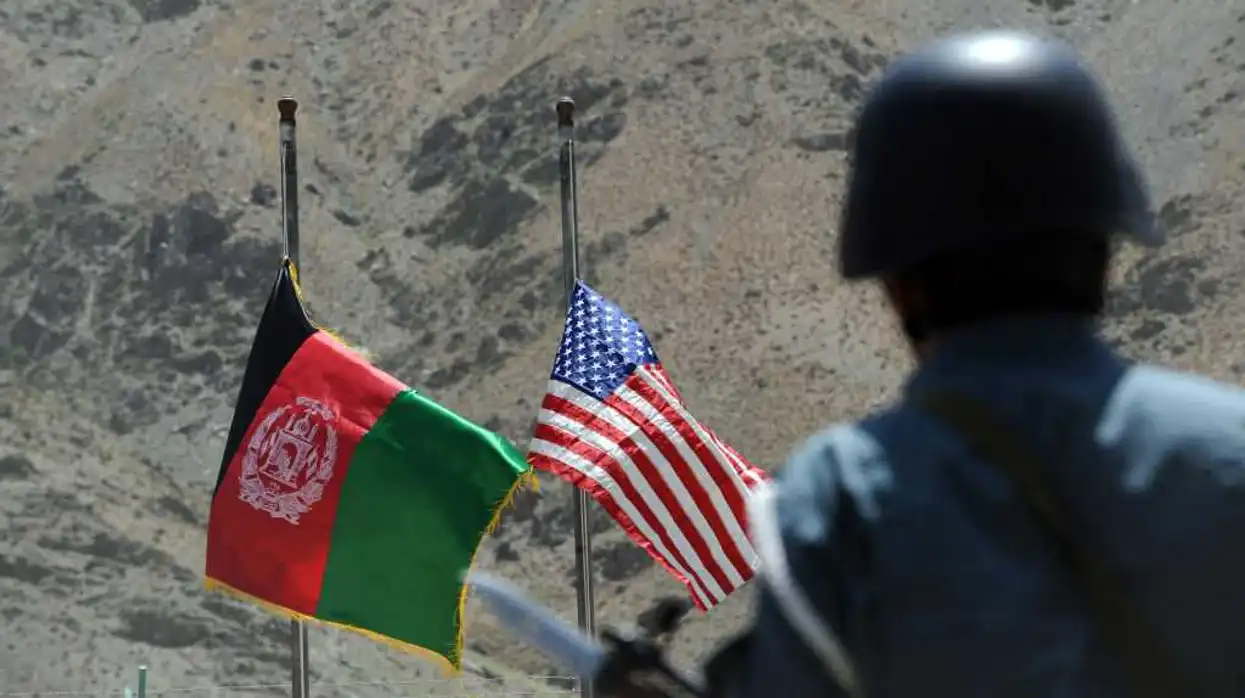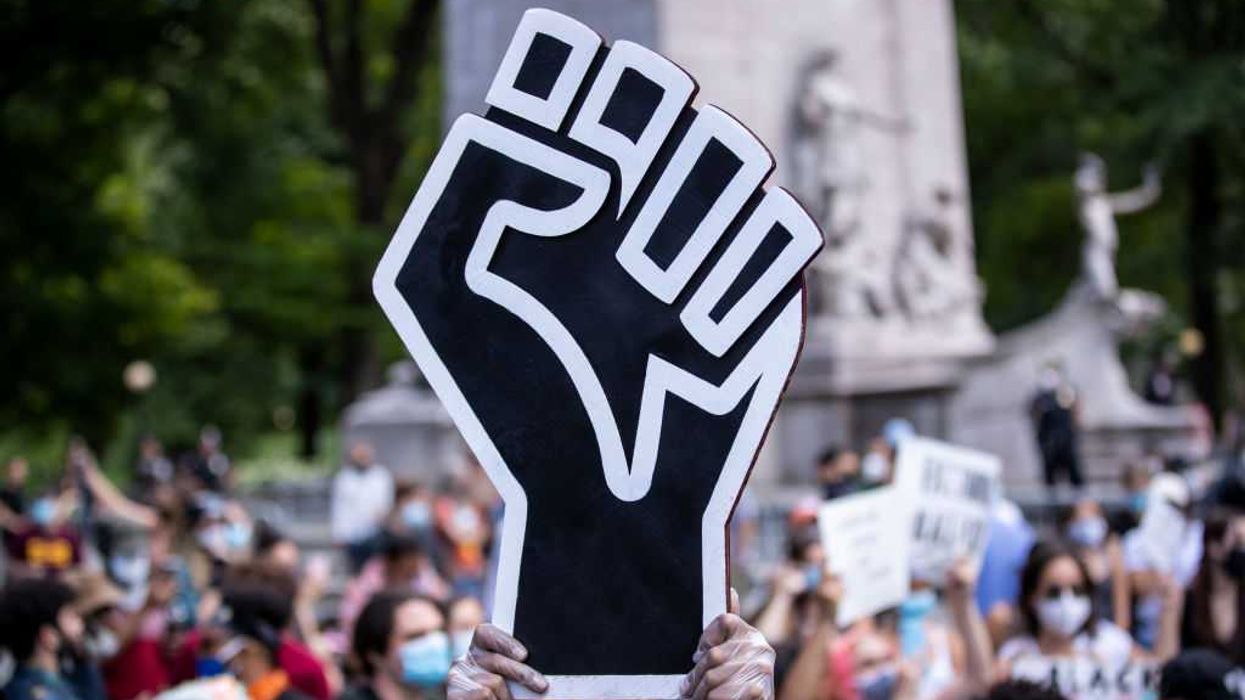© 2025 Blaze Media LLC. All rights reserved.
BENGHAZI, Libya (AP) -- French fighter jets struck an air base deep inside Libya and destroyed one of Moammar Gadhafi's planes Thursday, and NATO ships patrolled the coast to block the flow of arms and mercenaries. Other coalition bombers struck artillery, arms depots and parked helicopters.

Libyan state television on Thursday showed blackened and mangled bodies that it said were victims of airstrikes in Tripoli, the capital. Rebels have accused Gadhafi's forces of taking bodies from the morgue and pretending they are civilian casualties.
The international military operation against Libyan leader Moammar Gadhafi's forces may last days or weeks - but not months, French Foreign Minister Alain Juppe said. But the rebels who largely control Libya's east remain outgunned and disorganized - instead of handing out weapons at a checkpoint, they were distributing sneakers to would-be fighters on Thursday.
The French strikes overnight hit a base about 250 kilometers (155 miles) south of the Libyan coastline, French military spokesman Thierry Burkhard told reporters in Paris on Thursday without elaborating on the target or possible damage.
France's joint chiefs of staff, in a statement on their Web site, said French surveillance aircraft noticed a Libyan combat plane that was flying near Misrata in violation of the U.N. Security Council resolution. A French Rafale fighter jet fired a guided air-to-ground missile on the Libyan jet after it landed at the Misrata air base.

In Tripoli, Libyan deputy foreign minister Khaled Kaim said that the "military compound at Juffra" was among the targets hit before dawn. Juffra is one of at least two air bases deep in Libya's interior, on main routes that lead from neighboring countries in the Sahara region that have been suppliers of arms and fighters for the Gadhafi regime.
The town of Sabha, about 385 miles (620 kilometers) south of Tripoli, has another air base and international airport and is a major transit point for the ethnic Tuareg fighters from Mali and Niger who have fought for Gadhafi for the past two decades. Malian officials say hundreds of Tuareg men have left to fight in Libya in the recent uprising.
Abdel Rahman Barkuli, a Libyan in exile originally from Sabha, said communications with his family there were abruptly cut on Wednesday night and heavy security is barring residents from moving in or out.
He said he spoke to residents in Sabha who reported several airstrikes before dawn: two targeted radars and one targeted a military camp. One of the radars is next to a mountain in the city that he said was packed with ammunitions and heavy weaponry.
"Thank God they didn't bomb the mountain because it would be a disaster" for the civilians living nearby, he said.
"My last contact with them, they said that the city is cordoned off by heavy security forces, of Faris Brigades. Snipers are on the rooftops," he said. "My family told me that Sabha has turned into a barracks."
Barkuli said members of two anti-Gadhafi tribes in the city were rounded up early in the protests that began Feb. 15. "No one knows anything about their whereabouts," he said.
NATO warships began patrolling Wednesday off Libya's Mediterranean coast in an effort the blockade's commander described as "closing the main front door" to weapons and mercenaries for Gadhafi.
Vice Adm. Rinaldo Veri said the Mediterranean was the most efficient way to get weapons into Libya and that it was impossible to patrol its entire coast. He expected to have enough vessels in place in a few days for effective operations.
Veri said NATO was prepared to board any suspect ships that don't voluntarily submit to inspections.
"If they should find resistance, the use of force is necessary," he said, noting that the Security Council had mandated all means necessary to enforce the embargo.
Coalition bombers planes and ships continued to strike at Gadhafi positions, including artillery, tanks, an ammunition bunker and a small number of helicopters as they sat on an airfield along the coast, a U.S. defense official said Thursday on condition of anonymity because he was not authorized to speak on the record.
More than a dozen Tomahawk cruise missiles were fired from U.S. and British ships in the Mediterranean Sea late Wednesday and early Thursday, their targets including Gadhafi's air defense missile sites in Tripoli and south of the capital. Other attacks were launched against an ammunition bunker near Misrata and forces south of Benghazi, the official said.
The U.N. Security Council authorized the embargo and no-fly zone to protect Libyan civilians after Gadhafi launched attacks against anti-government protesters who wanted him to leave after 42 years in power. But rebel advances have foundered, and the two sides have been at stalemate in key cities such as Misrata and Ajdabiya, the gateway to the opposition's eastern stronghold.
Ajdabiya has been under siege for more than a week, with the rebels holding the city center but facing relentless shelling from government troops positioned on the outskirts.
Residents fleeing the violence said the situation inside the city has deteriorated in recent days. Two airstrikes targeted the area early Thursday, said a rebel, Taha el-Hassadi.
Mohammed Ali, 56, who fled with his family in a station wagon said, "They've cut everything - the electricity, the water. It's getting worse and worse inside."
Government troops also continued barraging the western city of Misrata on Thursday but were forced to roll back their tanks periodically amid coalition airstrikes.
A 42-year-old doctor in the city said shelling had damaged a mosque and a hotel near the hospital.
"When the allies' planes were seen flying in the sky, the shelling stopped and the tanks fled," he said. "We still have to deal with snipers in the main street in Misrata and try to warn people to stay away from it."
Luis Moreno-Ocampo, the International Criminal Court's prosecutor, said he was "100 percent" certain that his investigation into attacks on Libyan protesters will lead to crimes against humanity charges against the Gadhafi regime.
The investigation was launched with unprecedented speed, which the prosecutor attributed to technology, which has brought images of Libyan violence to the world.
"Technology is reducing the distance between people in Libya and people in the (rest of the) world," the Argentine prosecutor said. "Journalists showing the killing of civilians in Libya created this willingness to intervene."
---
Michael and Associated Press writer Ben Hubbard reported from Cairo. Associated Press writers Jamey Keaten in Paris; Pauline Jelinek and Bob Burns in Washington; Nicole Winfield in Rome; and Martin Vogl in Bamako, Mali, contributed to this report.
Want to leave a tip?
We answer to you. Help keep our content free of advertisers and big tech censorship by leaving a tip today.
Want to join the conversation?
Already a subscriber?
Jonathon M. Seidl is a former managing editor of Blaze News and a best-selling author and speaker. His next book, “Confessions of a Christian Alcoholic,” will be released on October 7, 2025.
Jonathon M. Seidl
Jonathon M. Seidl is a former managing editor of Blaze News and a best-selling author and speaker. His next book, “Confessions of a Christian Alcoholic,” will be released on October 7, 2025.
more stories
Sign up for the Blaze newsletter
By signing up, you agree to our Privacy Policy and Terms of Use, and agree to receive content that may sometimes include advertisements. You may opt out at any time.
Related Content
© 2025 Blaze Media LLC. All rights reserved.
Get the stories that matter most delivered directly to your inbox.
By signing up, you agree to our Privacy Policy and Terms of Use, and agree to receive content that may sometimes include advertisements. You may opt out at any time.






